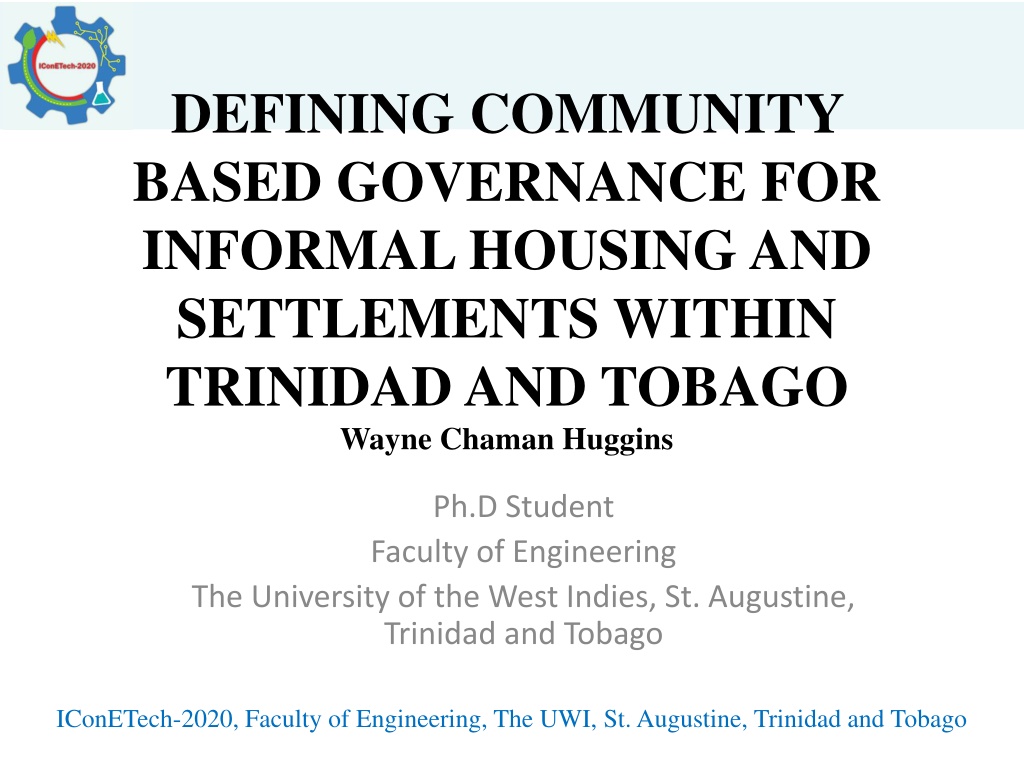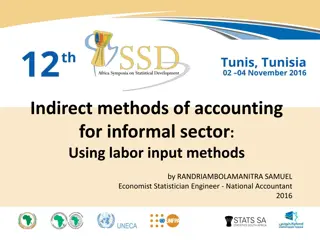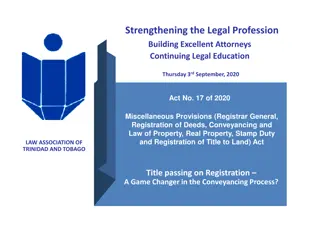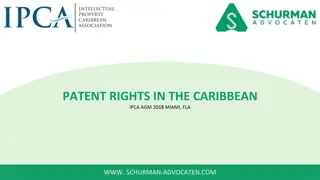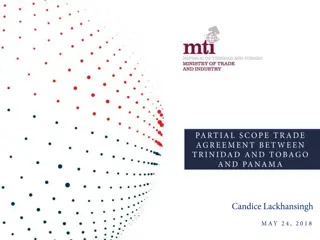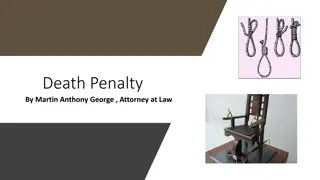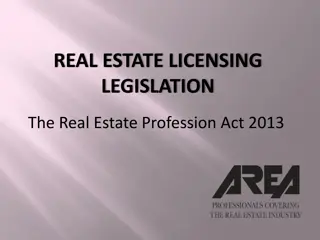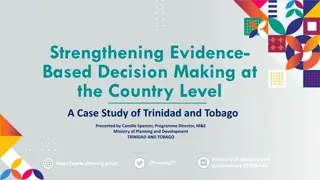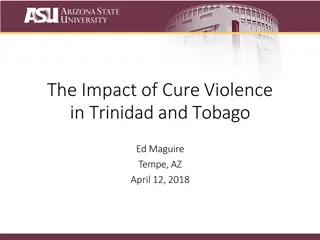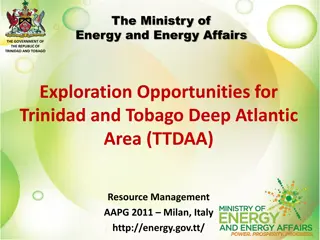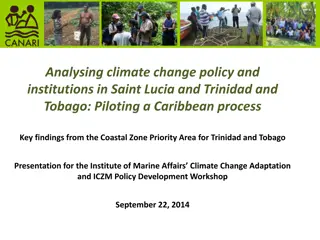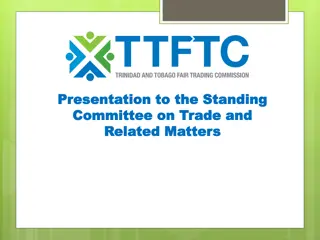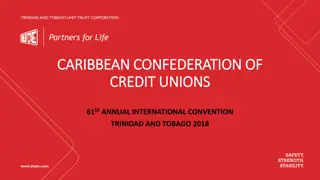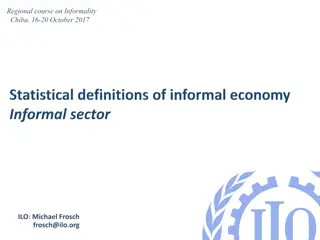Community-Based Governance for Informal Housing in Trinidad and Tobago
This study by Wayne Chaman Huggins explores the concept of community-based governance for informal housing and settlements in Trinidad and Tobago. It delves into the definition, objectives, assumptions, proposed model, and methodology for establishing effective governance structures within these communities.
Uploaded on Nov 25, 2024 | 0 Views
Download Presentation

Please find below an Image/Link to download the presentation.
The content on the website is provided AS IS for your information and personal use only. It may not be sold, licensed, or shared on other websites without obtaining consent from the author. Download presentation by click this link. If you encounter any issues during the download, it is possible that the publisher has removed the file from their server.
E N D
Presentation Transcript
DEFINING COMMUNITY BASED GOVERNANCE FOR INFORMAL HOUSING AND SETTLEMENTS WITHIN TRINIDAD AND TOBAGO Wayne Chaman Huggins Ph.D Student Faculty of Engineering The University of the West Indies, St. Augustine, Trinidad and Tobago IConETech-2020, Faculty of Engineering, The UWI, St. Augustine, Trinidad and Tobago
SUMMARY OF SLIDES Introduction Objectives Methodology Results Next Steps References IConETech-2020, Faculty of Engineering, The UWI, St. Augustine, Trinidad and Tobago
INTRODUCTION Academic Work 1st Paper- Presentation of Model of Governance Definition Application Ethical Issues No intention to assign blame Not political Greater good IConETech-2020, Faculty of Engineering, The UWI, St. Augustine, Trinidad and Tobago
OBJECTIVES Debate and Convergence of Thoughts on Ideas of Governance Clarity on what is Governance and Good Governance Ignored the role of the sovereign state (perpetual) Look beyond Governments and political parties (transitionary) Working model pedagogical purposes-wider uses e.g. Climate change Definition of Community Based Governance Social / Community Capital vs Political Capital- opportunity for modelling ! Role of Community Based Organisations more than connecting people with access to urban spaces, land Build Resilience on how we monitor Governance- Project success and sustainability IConETech-2020, Faculty of Engineering, The UWI, St. Augustine, Trinidad and Tobago
ASSUMPTIONS The sovereign state is embedded in a socio / political, institutional matrix; has longevity and stable. Community based spaces and Governance (Community based Governance) is based on common aspirations of the community. Governments have a political dimension and will support strategies that ensures political survival. Community Based Governance: the manner in which the power of the community, as defined by the Community Space where it has jurisdiction, is utilised in managing and controlling the social and economic resources at the community s disposal or use, for the community s development in accordance with the social contract, goals, aspirations and objectives of the community with that of the Community Based Organisation in that Community Space. IConETech-2020, Faculty of Engineering, The UWI, St. Augustine, Trinidad and Tobago
PROPOSED MODEL IConETech-2020, Faculty of Engineering, The UWI, St. Augustine, Trinidad and Tobago
METHODOLOGY Literature review Defining the Model Refining the Model using experiences from Trinidad- governance spaces and government Mixed Methods approaches for integrating quantitative with qualitative Quantitative, Videos, Interviews, Art Forms, Song, Dance Focus on Model and the definition IConETech-2020, Faculty of Engineering, The UWI, St. Augustine, Trinidad and Tobago
RESULTS Figure Title: COC approved (Source: Corp. Sec Office, CEO Reports) IConETech-2020, Faculty of Engineering, The UWI, St. Augustine, Trinidad and Tobago
RESULTS Figure Title: COC approved IConETech-2020, Faculty of Engineering, The UWI, St. Augustine, Trinidad and Tobago
RESULTS Table Title: COC Governance outcomes Government Governance (LSA) Dimension Stakeholders in COC outcomes Minister, other Ministers & Cabinet Ministry Housing Urban Development no no no of Squatter Community All Squatter Communities and 1 2 3 Transparency Accountability Effectiveness Efficiency Rule of Law Responsive Consensus Oriented Equitable Inclusive Participatory Legitimacy yes Yes (political) yes no no no no no no and 4 5 6 7 yes yes yes yes no no no no no no no no no no no no and 8 + 1 yes yes no no no no no no IConETech-2020, Faculty of Engineering, The UWI, St. Augustine, Trinidad and Tobago
RESULTS Table Title: Infrastructure Governance Outcomes Government (LSA) Dimension Governance Stakeholders in Upgrade of Infrastructure outcomes Minister, Ministers Cabinet other Ministry Housing and Urban Development no Yes (financial expenditure) no of Squatter Community All Squatter Communities & 1 2 Transparency Accountability yes yes no no no no 3 Effectiveness Efficiency Rule of Law Responsive Consensus Oriented Equitable and Inclusive Participatory and yes no no 4 5 6 7 8 yes yes yes yes yes no no no no no no no no no Tokenism & Therapy no no no no no no + 1 Legitimacy yes no no IConETech-2020, Faculty of Engineering, The UWI, St. Augustine, Trinidad and Tobago
NEXT STEPS Modelling using Game Theory Non-Cooperative Games- Nash Equilibrium (prisoner s dilemma) Applicability why certain outcomes occur Intersectionality in the context of urban and social exclusion as an outcome of prisoner s dilemma Can the aspects of Governance as indicators, point to predictable outcomes for Cooperative and Non Cooperative Games Trinidad cases Squatter communities-La Guiria, Bois Bande Sou Sou Lands-All Applicability and remodelling Revised methodology Revisit Trinidad cases Caribbean Countries St. Lucia St. Vincent and the Grenadines Jamaica- Trench Town Latin American Guyana Costa Rica: Froprovi (2001) Ecuador (2001): Solanda vs Santa Ana Mexico : Neza-Chalco-Ltza Barrio IConETech-2020, Faculty of Engineering, The UWI, St. Augustine, Trinidad and Tobago
REFERENCES [1] UN Department of Economic and Social Affairs (UNDESA), The United Nations, New York: UN. Accessed February Thursday, 2019. https://www.un.org/development/desa/en/news/population/2018 -revision-of-world-urbanization-prospects.html. [2] W.C. Huggins. 2011. "Is Rapid Urbanisation in the Developing World a Natural Adaptation to Climate Change? Revisiting the Over- Urbanisation Debate." International Conference on Climate Change and Social Issues. Colombo: Institute of Human Development and Training (Sri Lanka) & Toulouse Business School (France). [3] J.W. Paller. 2015. "Informal Networks and Access to Power to Obtain Housing in Urban Slums in Ghana." Africa Today (Indiana University Press) Vol. 62. No.1 (Special Issue: The Politics of the Nonstate Provision of Public Goods in Africa): pp.31-55. Accessed February 22, 2019. https://www.jstor.org/stable/10.2979/africatoday.62.1.31. [4] D. Brautigam. 1991. Governance and Economy, A Review. Policy Research, World Bank, Washington, DC: World Bank, 54. IConETech-2020, Faculty of Engineering, The UWI, St. Augustine, Trinidad and Tobago
REFERENCES [5] S. Lateef, C. Bryant, R. Harris, P. Isenman, G. Lamb, A. Rigo, and M. Shirley. 1992. Governance and Development. Study, Washington, DC: The World Bank. Accessed February 19, 2019. http://documents.worldbank.org/curated/en/60495146873944767 6/pdf/multi-page.pdf. [6] M. Stevens, R. Gonzales Cofino, E. Betancourt, and S. Gnanaselvam. 1994. Governance: The World Bank's Experience. Study, Washington, DC: The World Bank. Accessed February Tuesday, 2019. http://documents.worldbank.org/curated/en/71147146876528596 4/pdf/multi0page.pdf. [7] E. Golshan. 2006. "Sovereignty, Governance and Government Performance." EROPA. IConETech-2020, Faculty of Engineering, The UWI, St. Augustine, Trinidad and Tobago
REFERENCES [8] J. Spanhove and K. Verhoest. 2007. Analyzing Government Governance at different. Paper for the EGPA SEMINAR FOR DOCTORAL STUDENTS AND JUNIOR RESEARCHERS, Institutuut Yoor de Overheid, KATHOLIEKE UNIVERSITEIT LEUVEN, Madrid: KATHOLIEKE UNIVERSITEIT LEUVEN. Accessed February Thursday, 2019. https://soc.kuleuven.be/io/pubpdf/IO0006005_egpa_spanhove.pdf [9] G. Stoker. 1998. "Governance as theory: five propositions." International Social Science Journal 50: 17-28. [10] A. Mohammed. 1997. "The Myth of the Megacity Solution." Habitat Debate Vol. 3 (No.2): 26-27. [11] S.R. Arnstein. 1969. "A ladder of citizen participation." Journal of the American Institute of Planners 35 (4): 216-224. doi:10.1080/019443669089772 IConETech-2020, Faculty of Engineering, The UWI, St. Augustine, Trinidad and Tobago
REFERENCES [12] K. Crenshaw. 1989. "Demarginalizing the Intersection of Race and Sex:A Black Feminist Critique of Antidiscrimination Doctrine, Feminist Theory and Antiracist Politics." University of Chicago Legal Forum 1989 (1 Article 8). Accessed April 21, 2019. https://chicagounbound.uchicago.edu/cgi/viewcontent.cgi?article= 1052&context=uclf. [13] R. Whittington 2015. "Giddens, Structuration Theory and Strategy as practice." In Cambridge Handbook of Strategy as Practice, 109-126. Accessed April 21, 2019. doi:10.10.1017/CC097811396811032.009. [14] P. Kissoon 2015. Intersections of Displacement: Refugees' Experience of Home and Homelessness. Newcastle upon Tyne, UK: Cambridge Scholars Publishing. [15] J. Greswell, C. Poth, and A. Onwuegbuzie. 2019. "Key Note Speakers." Third Regional Mixed Methods Research Conference: Integrating Qualitative and Quantitative Approaches: Tensions, Challenges and Possibilities. Port of Spain, March 26-28. IConETech-2020, Faculty of Engineering, The UWI, St. Augustine, Trinidad and Tobago
REFERENCES [16] A. Cornwall. 2002. "Making spaces, changing places: situation participation in development." Institute of Development Studies (170): 43. [17] M. Taylor. 2007. "Community Participation in the Real World: Opportunities and Pitfalls in New Governance Space." Urban Studies (Routledge, Taylor & Francis) 44 (2): 297-317. United Nations. 2018. 2018 Revision of World Urbanization Prospects, Population Division. [18] P. Selznick. 1948. "Foundations of the Theory of Organization." American Sociological Review 13 (1): 25-35. Accessed November Wednesday 6th, 2019. doi:10.2307/2086752. [19] S. Bowles and G. Herbert. 2002. "Social Capital and Community Governance." The Economic Journal (Blackwell Publishers) 112 (November): F419-F436. IConETech-2020, Faculty of Engineering, The UWI, St. Augustine, Trinidad and Tobago
THANK YOU! IConETech-2020, Faculty of Engineering, The UWI, St. Augustine, Trinidad and Tobago
